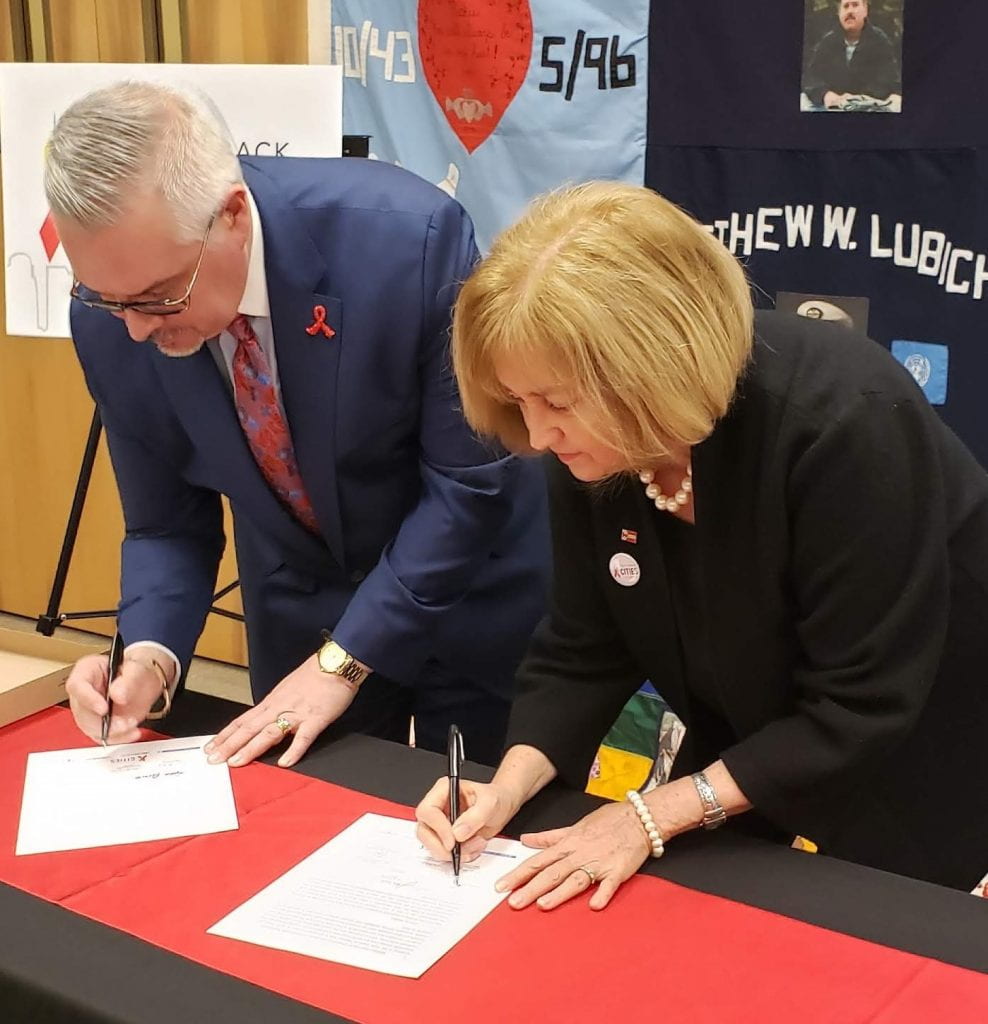As of Dec. 1, 2019, St. Louis is now one of more than 300 Fast-Track Cities committed to ending HIV/AIDS by the year 2030.
The Institute for Public Health and Washington University are committed to helping St. Louis leaders reach initiative goals.
On Dec. 1, National World AIDS Day, the Larry J. Shapiro Director of the Institute for Public Health, Bill Powderly, MD, joined City of St. Louis Mayor Lyda Krewson and city health officials; representatives from County Executive Sam Page’s office; Dr. Jose M. Zuniga, President/CEO of the International Association of Providers of AIDS Care (IAPAC, facilitating partner of the initiative); Washington University School of Medicine faculty; and local healthcare service organizations at a downtown news conference announcing the
Fast-Track Cities, St. Louis initiative.

Dr. Bill Powderly, seated first row, far left, and the panel of government, health and community leaders dedicated to the Fast-Track Cities St. Louis initiative. Dr. Fredrick L. Echols, director of health for the City of St. Louis, second row center, holds the signed proclamation. Other WashU faculty pictured: Dr. Mati Hlatshwayo top row, far left; Dr. Elvin Geng top row, second from left, and Dr. Hilary Reno, first row, far right.
Mayor Krewson and Dr. Zuniga signed an official declaration, which calls on St. Louis to strengthen local HIV efforts and achieve a set of programmatic targets to significantly reduce new HIV infections and end AIDS-related deaths. These targets call for:
- 90 percentof people living with HIV (PLHIV) knowing their status;
- 90 percentof all PLHIV receiving sustained antiretroviral treatment; and,
- 90 percentof all PLHIV on antiretroviral treatment achieving durable viral suppression.

Dr. Jose M. Zuniga, President/CEO of the International Association of Providers of AIDS Care (IAPAC, facilitating partner of the initiative) and Mayor Lyda Krewson sign the proclamation initiating St. Louis as a Fast-Track City.
“Thirty-five years ago, every one of the AIDS patients I treated died; every one,” said Dr. Powderly, also the J. William Campbell Professor of Medicine at Washington University School of Medicine. “Today, with antiretroviral medications and prophylactic pills like PrEP, there is no reason anyone should die of AIDS.”
Elvin Geng, MD, MPH, professor of medicine at Washington University School of Medicine and director of the Center for Dissemination and Implementation at the Institute for Public Health said, “World AIDS Day is an important time to recognize that AIDS is still an epidemic but now, more than ever, we have treatment and interventions to ensure that people at risk can avoid infection, and people living with HIV can have happy, healthy and long lives.”
According to the Department of Health for the City of St. Louis, in 2018, more than 12,800 people were living with HIV/AIDS in the St. Louis region (more than 50% in the city, and more than 35% in St. Louis County.)
Mati Hlatshwayo, MD, MPH, clinical instructor of medicine at Washington University School of Medicine, noted that HIV/AIDS patients in the city of St. Louis consist of men who have sex with men, African American women, LatinX persons, and persons under age 25. She added that the stigma levied against these individuals continues to be staggering.
Mayor Krewson stated that “an effective, coordinated local government leadership team” is needed to reach the 90-90-90 targets. “We must put PEOPLE at the center of this mission and create equitable healthcare for all,” she said, adding that it is still legal in Missouri to discriminate against people in the LGBTQI community. “We’re working to pass legislation that makes this act a crime.”
County Executive representative, Cora Faith Walker reminded the 50+-person crowd that this is the “last World AIDS Day of this decade” and currently, “rates of new HIV infection are 10 times higher among blacks than whites in Missouri.” She also said one of the efforts the county is leading is to make public dis-aggregated data on overdoses so that health officials can design specific interventions that work for opioid abusers, a rising population among HIV/AIDS patients.
Dr. Zuniga of IAPAC said New York City is the first of 10 Fast Track Cities to achieve its 90-90-90 goals. He said this has been accomplished through political commitment; the access to and sharing of key public health data among local government and health leaders; and, equity-based approaches to reducing AIDS-related deaths.
When asked how the panel of experts would incorporate diverse and unheard populations into the 90-90-90 effort, Hilary Reno, MD, PhD, Washington University physician and assistant professor at the School of Medicine said the key is to “support sexual health as a public health issue and do a better job of listening to all populations including transgender and gender diverse people.”
Other community leaders on the panel said that recognizing social determinants of health play a role in the AIDS epidemic is very important in helping eradicate the disease. Among the social determinants mentioned: stigma, homelessness, access to healthcare, and illicit drug use.
Dr. Powderly said that Washington University was among the first research universities in the country to conduct HIV investigational trials that have led to the modern era of treatment. “Our new chancellor, Andrew Martin, has recently called for the university to be ‘Washington University FOR St. Louis.’ Powderly added, “We are committed to working with local leaders to achieve this goal. We will be with you all the way.”
